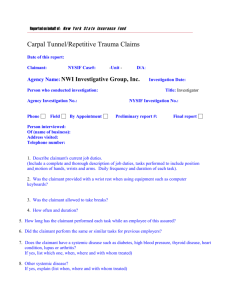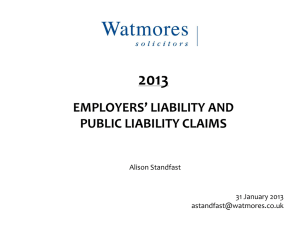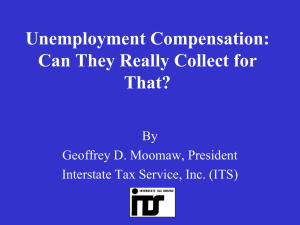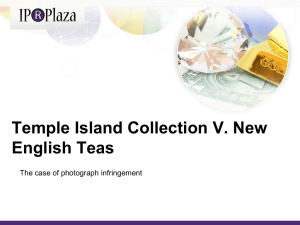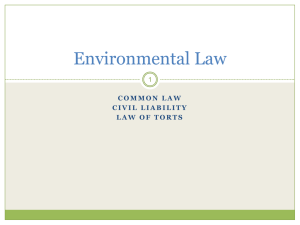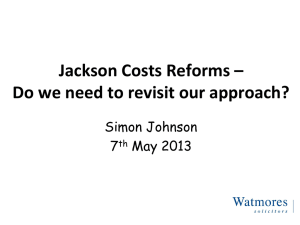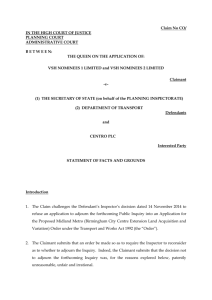at the time the claim is settled for that particular claimant
advertisement
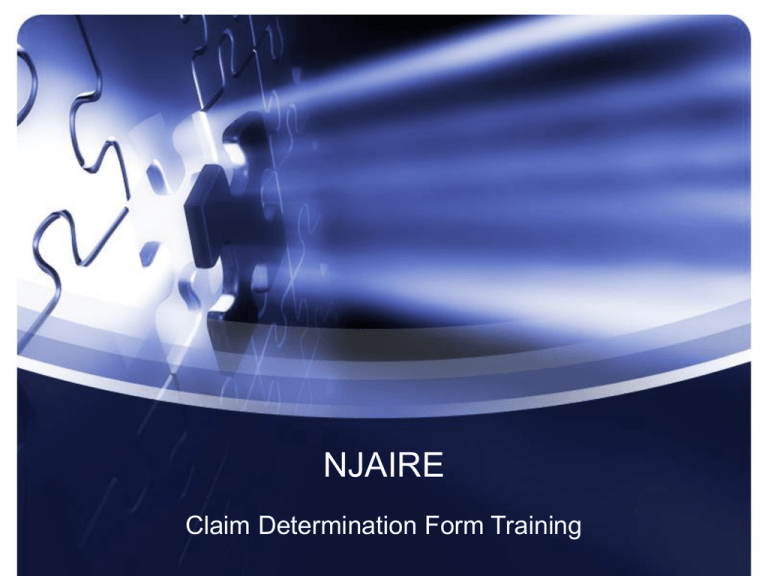
NJAIRE Claim Determination Form Training Purpose of training • Reinforce expectations of member company claim reporting • Identify common errors made in completing the Claim Determination Form (CDF) • Provide necessary information and training that will ensure form accuracy “The determination whether a Bodily Injury Liability claimant payment qualifies as a Reportable Claimant must be made at the time the claim is settled for that particular claimant; such determination shall be based on facts that are known or can reasonably be anticipated at the time of settlement.” NJAIRE Procedure Manual Section III, Chapter 1 Accurate completion of the Claim Determination Form (CDF) is the key to successful reporting and the prevention of assessment errors, interest and penalties. Member company audits trace most reporting errors to mistakes made in the completion of the Claim Determination Form (CDF) Effective January, 2012, the Claim Determination form is required for all BI loss payments. Claim Determination Form Common mistakes and CDF errors • Claimant policy threshold selection is not properly verified and/or documented • Claimant threshold eligibility is not accurately determined • Economic loss payments are included in the amount reported to NJAIRE • Claimant residency (state) is incorrect • Unnecessary questions are answered, causing confusion in the ultimate determination • The CDF is otherwise incomplete or incorrect Threshold Verification The NJAIRE Procedure Manual allows for 5 methods of claimant threshold selection: • Secure a valid policy document from the Claimant • Utilize the reporting facilities of ISO ClaimSearch • Obtain written verification from the member Liability insurer of the third party claimant confirming the threshold selection • Obtain telephone verification from the member insurer or the insurance agent of the third party claimant confirming the selection – the claim file must contain the telephone number called and the identity of the party providing the information, and the date such telephone verification was obtained. • Obtain documentation that the claimant had no insurance. NJAIRE Procedure Manual Section III, Chapter 2:Threshold Verification Guidelines Threshold selection eligibility & application The No Limitation on Lawsuit threshold applies to claimants in the following ways: • • • • • Claimant is a NJ resident collecting PIP from an automobile policy on which they are the named insured, resident spouse or resident child of the named Insured and the No Limitation on Lawsuit threshold was selected Claimant is a NJ resident collecting PIP from a policy that is not theirs or not held by a resident spouse or parent Claimant was the driver or passenger of a non-owned vehicle that is uninsured and the claimant has no PIP coverage of their own or in their household Claimant is a NJ resident not eligible for PIP because they are subject to Workers Comp or in a taxi, limo, motorcycle, nonprivate passenger automobile or bus (NJ Transit) that does not have PIP and they do not have their own personal auto policy Claimant is an out of state resident, involved in a NJ accident and they are not operating their own car, or they are insured with a carrier that is not authorized to business in NJ. – Includes spouse and resident children of the owner who are also in the same vehicle Common mistakes and CDF errors • Claimant threshold eligibility is not accurately determined Common mistakes and CDF errors • Economic loss payments are included in the amount reported to NJAIRE, where available. Common mistakes and CDF errors • Claimant residency (state) is incorrect • Unnecessary questions are answered, causing confusion in the ultimate determination • The CDF is otherwise incomplete or incorrect Remember …. • It is the carrier’s responsibility to ensure the accuracy of claim determinations. • Members are required to utilize and maintain a copy the Reportable Claimant Determination Form for all paid Bodily Injury claimants, in either paper or electronic form.

